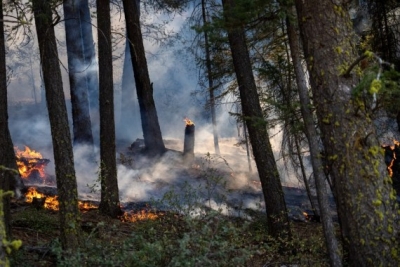New Delhi, Feb 23 : Climate change and land-use change are projected to make wildfires more frequent and intense, with a global increase of extreme fires of up to 14 per cent by 2030, 30 per cent by the end of 2050 and 50 per cent by the end of the century, a new report by the UN Environment Programme (UNEP) and GRID-Arendal said on Wednesday.
The paper calls for a radical change in government spending on wildfires, shifting their investments from reaction and response to prevention and preparedness.
The report, Spreading like Wildfire: The Rising Threat of Extraordinary Landscape Fires, finds an elevated risk even for the Arctic and other regions previously unaffected by wildfires.
The report is released before the resumed 5th session of the UN Environment Assembly (UNEA-5.2) convenes in Nairobi, between February 28 and March 2.
The publication calls on governments to adopt a new ‘Fire Ready Formula’, with two-thirds of spending devoted to planning, prevention, preparedness, and recovery, with one third left for response.
Currently, direct responses to wildfires typically receive over half of related expenditures, while planning receives less than one per cent.
To prevent fires, authors call for a combination of data and science-based monitoring systems with indigenous knowledge and for a stronger regional and international cooperation.
“Current government responses to wildfires are often putting money in the wrong place.Those emergency service workers and firefighters on the frontlines who are risking their lives to fight forest wildfires need to be supported,” said Inger Andersen, UNEP Executive Director.
“We have to minimize the risk of extreme wildfires by being better prepared: invest more in fire risk reduction, work with local communities, and strengthen global commitment to fight climate change.”
Wildfires disproportionately affect the world’s poorest nations.With an impact that extends for days, weeks and even years after the flames subside, they impede progress towards the UN Sustainable Development Goals and deepen social inequalities:
People’s health is directly affected by inhaling wildfire smoke, causing respiratory and cardiovascular impacts and increased health effects for the most vulnerable; the economic costs of rebuilding after areas are struck by wildfires can be beyond the means of low-income countries; watersheds are degraded by wildfires’ pollutants; they also can lead to soil erosion causing more problems for waterways; and wastes left behind are often highly contaminated and require appropriate disposal.
Wildfires and climate change are mutually exacerbating.
Wildfires are made worse by climate change through increased drought, high air temperatures, low relative humidity, lightning, and strong winds resulting in hotter, drier, and longer fire seasons.
At the same time, climate change is made worse by wildfires, mostly by ravaging sensitive and carbon-rich ecosystems like peatlands and rainforests.
This turns landscapes into tinderboxes, making it harder to halt rising temperatures.
Wildlife and its natural habitats are rarely spared from wildfires, pushing some animal and plant species closer to extinction.
A recent example is the Australian 2020 bushfires, which are estimated to have wiped out billions of domesticated and wild animals.
There is a critical need to better understand the behaviour of wildfires.
Achieving and sustaining adaptive land and fire management requires a combination of policies, a legal framework and incentives that encourage appropriate land and fire use.
The restoration of ecosystems is an important avenue to mitigate the risk of wildfires before they occur and to build back better in their aftermath.
Wetlands restoration and the reintroduction of species such as beavers, peatlands restoration, building at a distance from vegetation and preserving open space buffers are some examples of the essential investments into prevention, preparedness and recovery.
vg/ksk/
#Arctic #wildfire #Assembly #Delhi #Delhi #New Delhi







